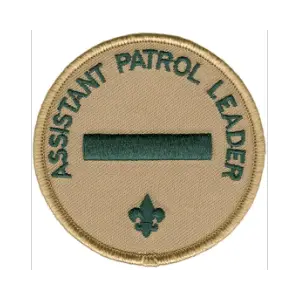The Assistant Patrol Leader (APL) is a youth leadership position within a Scouts BSA patrol. They serve as an assistant to the Patrol Leader (PL) and are responsible for helping to plan and execute the patrol’s activities and events. The APL is also responsible for helping to train and mentor other patrol members.

One of the key responsibilities of the APL is to help the PL with the planning and execution of patrol meetings and activities. This includes working with other patrol members to develop the patrol’s annual plan and ensuring that each meeting and activity is well-organized and executed smoothly.
Another important role of the APL is to assist with the training and mentoring of other patrol members. This includes working with the PL to develop and implement training programs for new members, as well as providing ongoing coaching and support to help them develop their skills.
The APL, besides having leadership duties, is also required to demonstrate leadership through personal conduct and adherence to the Scout Oath and Law. This entails serving as a role model for fellow Scouts by embodying the principles of Scouting and displaying a resolute dedication to community and service.
The position of Assistant Patrol Leader does not qualify for the leadership requirements for advancement. See the leadership positions listed in the Star, Life, and Eagle requirements in the Scouts BSA handbook.
The description below represents an example of the requirements and expectations for this position in one troop. Specifics can vary from one troop to another.
The printable copy also includes a self evaluation form for the position on the second page. Youth leaders might benefit from self evaluating during their term. If you use this, then keep it positive with them. It should only be used to help them recognize areas they should be working on.
Assistant Patrol Leader Qualifications and Duties
This is just an example. Adjust as needed to meet the size, customs, and needs of your unit.
Qualifications:
- Appointed by the Patrol Leader with Scoutmaster approval
- Tenderfoot Rank or higher Exception: There is no rank requirement for the Assistant Patrol Leader for the new scout patrol. (This is not a BSA requirement)
Reports to: The Patrol Leader
Trained by: Assistant Senior Patrol Leader with assistance from the Assistant Scoutmaster for Older Scouts (or by the Troop Guide and Assistant Scoutmaster for New Scouts if this is a new scout patrol)
May not serve two consecutive terms
Assistant Patrol Leader duties:
- Assist the Patrol Leader in planning and leading patrol meetings and activities
- Helps the Patrol Leader keep patrol members informed.
- Assists the Patrol Leader in preparing the patrol to take part in all troop activities.
- Arrive 5 minutes before the start of troop meetings.
- Direct the patrol at meetings and activities
- Take charge of the patrol in the absence of the Patrol Leader.
- Represent the patrol at Patrol Leaders’ Council (PLC) meetings in the absence of the Patrol Leader.
- Work with the other troop leaders to make the troop run well.
- Participate in outings. Attendance expectation 65%
- Attend troop meetings. Attendance expectation 65%
- Help develop patrol spirit.
- Set a good example.
- Wear the field uniform (class A) correctly to all regular troop meetings and religious services.
- Wear the activity uniform (class B t-shirt) to all outings and other troop activities.
- Live by the Scout Oath and Law.
- Show Scout Spirit.
Frequently Asked Questions
Can the position of Assistant Patrol Leader be used for rank advancement?
The role of Assistant Patrol Leader does not qualify as an authorized position of responsibility for progressing in rank to Star, Life, or Eagle.
Is there a minimum age or rank requirement for Assistant Patrol Leader?
There is not a minimum set by BSA. However troops may set their own qualifications based on the size of their troop and the maturity of their troop. For example, a Scout who has not advanced past Tenderfoot might not be a good fit for an older Scout patrol.


Leave a Reply